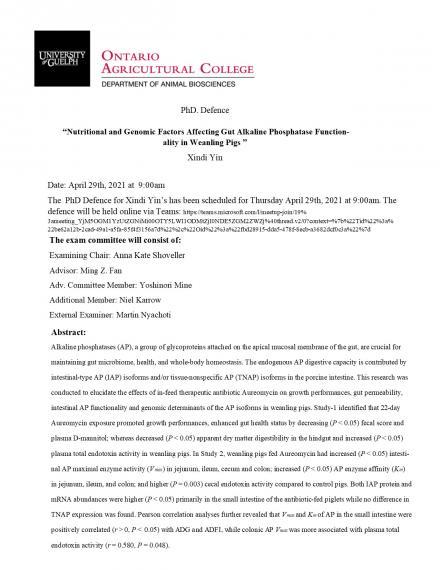Xindi Yin's PhD Defence
Date and Time
Location
Teams: https://teams.microsoft.com/l/meetup-join/19%3ameeting_YjM5OGM1YzUtZGNiMi00OTY5LWI1ODMtZjI0NDE5ZGM2ZWZj%40thread.v2/0?context=%7b%22Tid%22%3a%22be62a12b-2cad-49a1-a5fa-85f4f3156a7d%22%2c%22Oid%22%3a%22fbd28915-dda5-478f-8ecb-a3682dcf0c3a%22%7d

Details
Alkaline phosphatases (AP), a group of glycoproteins attached on the apical mucosal membrane of the gut, are crucial for maintaining gut microbiome, health, and whole-body homeostasis. The endogenous AP digestive capacity is contributed by intestinal-type AP (IAP) isoforms and/or tissue-nonspecific AP (TNAP) isoforms in the porcine intestine. This research was conducted to elucidate the effects of in-feed therapeutic antibiotic Aureomycin on growth performances, gut permeability, intestinal AP functionality and genomic determinants of the AP isoforms in weanling pigs. Study-1 identified that 22-day Aureomycin exposure promoted growth performances, enhanced gut health status by decreasing (P < 0.05) fecal score and plasma D-mannitol; whereas decreased (P < 0.05) apparent dry matter digestibility in the hindgut and increased (P < 0.05) plasma total endotoxin activity in weanling pigs. In Study 2, weanling pigs fed Aureomycin had increased (P < 0.05) intesti-nal AP maximal enzyme activity (Vmax) in jejunum, ileum, cecum and colon; increased (P < 0.05) AP enzyme affinity (Km) in jejunum, ileum, and colon; and higher (P = 0.003) cecal endotoxin activity compared to control pigs. Both IAP protein and mRNA abundances were higher (P < 0.05) primarily in the small intestine of the antibiotic-fed piglets while no difference in TNAP expression was found. Pearson correlation analyses further revealed that Vmax and Km of AP in the small intestine were positively correlated (r > 0, P < 0.05) with ADG and ADFI, while colonic AP Vmax was more associated with plasma total endotoxin activity (r = 0.580, P = 0.048). Study-3 indicated that IAP isoforms primarily expressed in the small intestine while both IAP and TNAP isoforms were expressed in cecum and colon. Results further showed glycosylation modifications are essential for weanling porcine small intestinal IAP functional maturation. Further in vitro cleavage of N-glycosylation experimental results collectively suggest that N-glycosylation is essential to maintain the small intestinal IAP isoform activity and the large intestinal TNAP isoform affinity, therefore differentially regulating the AP isoforms’ functionality in weanling pigs. Thus, intestinal AP functionality was modulated by therapeutic antibiotic treatment, which may help explain the antibiotics-induced growth promotion in weanling pig and metabolic endotoxemia.